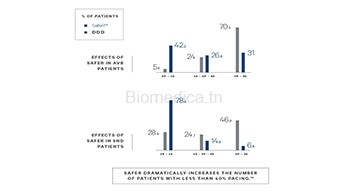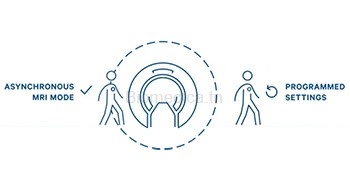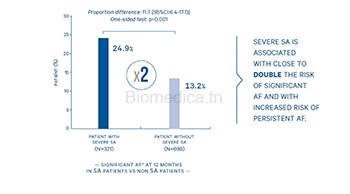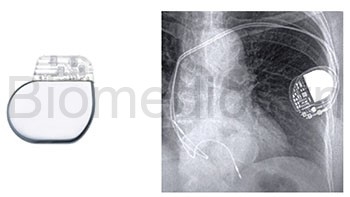Pacemakers : The smallest body scanner in the world is held by the MRI machine.
Introducing a revolutionary innovation in medical technology, we introduce the smallest dual-chamber conditional pacemaker that has been exclusively designed to accommodate full-body MRI scans.
Get optimal results while minimizing the space required.
The primary goal of the is to improve patient outcomes while maximizing practice efficiency.
The goal of creating a family of physiological pacemakers is to improve patient outcomes and optimize the efficiency of medical practice.
Using just 8 cc, an astonishing 12-year lifespan can be achieved.
The world's smallest dual-chamber pacemaker is a remarkable example of medical innovation, demonstrating its unwavering durability.
Powered by sophisticated algorithms with exceptional levels of intelligence.
----
Pacemakers
Pacemakers are devices used to regulate and stabilize the heart's rhythm.
To restore a regular heart rhythm, electrical stimulation is delivered by a pacemaker. Pacemakers currently weigh around 28 g and are a size comparable to a 2 euro coin.
A slow or irregular heartbeat, called bradycardia, usually occurs when the heart beats fewer than 60 times per minute. At these reduced rates, the heart is unable to supply enough blood and oxygen to the body during regular activities or exercise. As a result, individuals may experience symptoms such as dizziness, persistent fatigue, shortness of breath, or episodes of fainting.
----
Definition
The standard approach to treating bradycardia involves cardiac pacing. To restore a regular heart rhythm, the use of a pacemaker is used. By delivering gentle electrical signals to the heart, the pacemaker effectively increases the heart rate and reduces symptoms associated with bradycardia.
----
Safer

Reduction of unnecessary RV pacing is a significant benefit seen in all pacemaker patients, including those with AV block.
The Auto MRI logo features a blue circle.
- Implementing advanced AV management techniques can significantly improve protective measures, as confirmed by studies conducted in the 5-13 range.
- In patients with SND and AVB, RV stimulation is significantly reduced.
- This individual has the ability to effectively manage different types of AV blocks, both at rest and during physical activity.
- This improvement to the device adds two additional years to its overall lifespan.
The diagnosis of AV block in this case is truly one of a kind.
----
AutoMR

Ensuring the safety and ease of MRI exams for patients with pacemakers.
Increase your flexibility by spending less time on your commitments.
Ensure the safety and convenience of pacemaker patients by simplifying the process of performing MRI exams.
The system will automatically return to its initial configuration.
There is no need for a follow-up visit after the MRI.
----
The term “Double Senso” refers to a unique sensory experience that encompasses multiple senses simultaneously.
The combination of an accelerometer and minute ventilation sensors in the design allows for physiological modulation of heart rate.
Adjust your routine to meet the demands of your metabolism while ensuring you engage in physical activity safely.
By integrating both an accelerometer and minute ventilation sensors, this design aims to effectively regulate heart rate at the physiological level.
----
Sleep apnea monitoring is commonly referred to as MAS.

Sleep apnea monitoring involves tracking instances of interrupted breathing and decreased airflow.
The key to reducing long-term risks is early detection.
A screening method that is both reliable and capable of detecting severe sleep apnea with a high level of specificity (85%) and sensitivity (89%) has been developed.
Compared to the apnea-hypopnea index*6, a correlation can be observed.
Created with the aim of monitoring the evolution of sleep apnea.
Apnea-hypopnea index (AHI) = number of events/number of hours of sleep
-----
Cardiac stimulator pacemakers delivery can be done in Tunis and all of Tunisia.
Tel: (+ 216) 54 471 830




